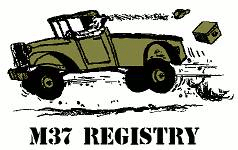My first revelation was that when the timing marks are lined up on the crank gear and cam gear, this is the position that the #1 cylinder is at TDC.......THE EXHAUST STROKE!!!! I had no idea and why would they do that?!? #1 TDC at ignition is when the timing marks are opposite each other like in this photo:

Here is a nice photo of the elusive timing marks on the crank pulley.

Check out the differnce in the pistons in my old engine:

And the pistons in the replacement engine, much stronger:

Valve before cleaning:

After cleaning:

Here is the box of .020 undersize rod bearings I got to install.

One of the rod bearings that got replaced. This is typical of what they all looked like. You can see the metal particles that got embeded in the babbitt. Result of a bypass oiling system. I am glad I changed them. The main bearings didn't look nearly as bad.

Here was the culprit of that "gentle knocking sound" in my old engine:

Plastiguage on a rod journal:

New expansion plugs going in. The old ones had some type of sealer on them so I used some pipe sealer.

Two weeks till the Vets Day parade. Plenty of time









